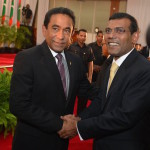Maldives Monetary Authority (MMA) Governor Dr Azeema Adam has accused Western governments and international institutions of discouraging potential investors.
“Western governments and international institutions not only keep on issuing public statements and reports on the Maldives, they would go whatever length it takes to portray the Maldives as not-so-sunny side of life to the potential investors,” Adam claimed in a speech delivered at the Berlin Economic Forum on November 9 – made public on Thursday (November 20).
The MMA governor’s criticism of the West has been echoed by President Abdulla Yameen and his cabinet who have this month accused the European Union of imposing trade restrictions on the Maldives following its refusal to “abandon” Islamic principles.
The central bank’s governor praised the Special Economic Zones (SEZs) Act introduced in August, which would “create new frontiers in developing the economy through diversification.”
However, Adam suggested that the standard SEZ model adopted in other countries might not work in the Maldives due to the lack of “cheap and abundant labour”.
“We have the opportunity now to learn from the experiences of other countries and develop SEZs customised for the Maldives,” she said.
“Yet, international institutions, and some of the larger advanced economies have raised alarms about creating SEZs in the Maldives and once again are advising us not to take such initiatives.”
“This is on the perceived belief that SEZs in small developing countries will create opportunities for a dark economy to emerge.”
While the statements in question concerning SEZs are unclear, the opposition Maldivian Democratic Party had contended that that the law would pave the way for money laundering and other criminal enterprises and authorise the president to “openly sell off the country” without parliamentary oversight.
Former President Mohamed Nasheed had dubbed the legislation the ‘Artur Brothers bill’, referring to an infamous pair of Armenians linked with money laundering and drug trafficking who made headlines last year after they were photographed with cabinet ministers.
The opposition leader has also dismissed SEZs and the proposed ‘mega-projects’ as “castles in the air.”
“External interventions”
Adam meanwhile acknowledged “large fiscal deficits with high recurrent spending”, “high levels of debt”, “low international reserves while maintaining a pegged exchange rate” and “weak institutions” as problems facing the Maldives.
Moreover, the country has “deep political polarisation,” which she contended was “fuelled, and at times created, by external interventions in local politics.”
Adam argued that prescriptions from international financial institutions to address macroeconomic issues – such as reducing the civil service, cutting subsidies, and raising tourism taxes – were drawn from “models developed for economies far advanced and different than the Maldives.”
The policy prescriptions “often have no relationship with local conditions,” Adam said.
She explained that the 350,000 population of the Maldives was dispersed in nearly 200 islands, only two of which have a population in excess of 10,000.
However, the government was “politically and legally” obliged to provide basic services to small island communities, which demand harbours, quay ways, healthcare, water and sanitation, and secondary education.
Closing down a school or health centre in an island would result in riots, Adam claimed, and MPs would submit no-confidence motions against ministers if a harbour construction project was scrapped.
“External policy prescriptions fail to recognise that newly established democracies would not have the necessary political strength to take tough measures to curb public expenditure that might impact the provision of basic services,” she observed.
Headlines of riots, instability and protests would scare tourists, she continued, and if “the tourism sector collapses, government revenue would collapse”.
Investment was therefore essential for economically and politically vulnerable countries to develop infrastructure, create jobs, “and in realising the dividends of democracy”.
“Therefore, what the larger countries and international institutions could do is, instead of coming up with draconian policy prescriptions and always raising alarm about our countries to potential investors, help to create opportunities for the small states to achieve sustainable development,” she said.
“Instead of condemning every little policy innovation, encourage home-grown and authentically local solutions to meet local needs. All we ask is give us a fair chance to develop our countries.”
The Maldives had defied conventional wisdom in developing a “sustainable, genuinely home-grown, authentic, and truly Maldivian” tourism industry despite a team of experts from UNDP in the late 1960s advising that it would not be viable, Adam said.
While the UNDP recommended development of a boatbuilding industry, Adam said the government instead took steps that “might have been seen as unconventional and indeed unorthodox,” such as the one-island one-resort concept, banning fishing and coral mining, and strict requirements to preserve natural vegetation.
Despite the success of the tourism industry with 1.1 million visitors last year, Adam suggested that a creative approach with a new model or a redesigned product was needed to attract more investment and create jobs for locals.
The government’s decision to introduce SEZs was “an unprecedented and a bold policy measure,” she said, which would “encourage more creativity in the tourism and other industries in the country.”
Related to this story
President Yameen hails passage of SEZ bill
Political consensus necessary for success of SEZs, cautions MMA governor
President Yameen slams “Western colonial powers,” declares foreign policy shift to East





Here is proof that a PhD in the name does not make one a professional
The governer is not doing what she should (improve banking sector) but doing what she absolutely should not do (make controversial and political statements). Each statement speaks of her political ambitions and one wonders why she accepted the job
Translation: If only the world would shut up about Maldives' abysmal human rights record and the government's disregard for foreign investments in the past then maybe we can scam some investors into this country and they'd be none the wiser.
Conclusion: This government is giving itself a bad name. Stop blaming others.
summed up how PPM manifesto/policies are laid out. top down projects or policies copied from some other parts of the world.
MDP manifesto preparation and policy formulation involves visiting the households and knowing from them what they want.
why is it that the minute someone disagrees with MDP and Pres Nasheed they are labelled as stupid or unreasonable? the whole point of MDP is to be tolerant and liberal I thought.
Haha someone is so excited that they have published that speech on their website! Brainfart!
So Dr.Governor, you think Western govs and international orgs are hell bent on spreading rumors about this sunny life, out of spite to make sure investors do not invest in the country because they hate small countries? and they will go to any length to make sure the sunny Maldives sinks to the bottom of the ocean. Big countries and international orgs are such bullies. They have no right to say bringing stupid SEZ is a bad idea because it is a tried and perfected solution for small pathetic countries to dig itself deeper in to the dung holes the politicians have dug for it.
I read halfway and skipped to the bottom of that embarrassing speech hoping there would be a "haa haa, I'm just kiddin" at the end. You disappoint. Things look exciting when you're still on the move, even on a downward spiral.
Blame everyone else and don't accept any responsibility for the pathetic state of your economy. Unfortunately for Maldives, the world doesn't owe you anything. If you screw over foreign investors, it is their right to take business to more reliable investment locations. For the millionth time, the sense of entitlement here is astounding. Forget about the West and their infidel money. Get down on your knees for China and Saudi. They'll take good care of you.
What a dumb speech
http://mma.gov.mv/GovSpeechBerlinEconomicForum.pdf
Next time this lady goes on to speak abroad, could some one please edit it.
She professes that ' Maldives is an unconventional country' with a 'dark economy''
LOL.
The "Gorunudhoaru" has been fed a pile of political crap, to be polite! Let's be clear about a few things.
The international community has on many occasions advised the Maldives of the one thing that's absolutely necessary to bring about international as well as national confidence in the entire country, i.e. its legal system and legislature. This has not emerged from the stone age on which it is founded!
Why, then, blame others when they view their opinions? In the world of business, the first and foremost principle is honor, integrity and transparency. Without that, SEZs, ABCs, ZYXs and anything else you invent will amount to zilch.
Time to learn the harsh truth of international business in the 21st century.
The present regime of Maldives is trying to emulate Communist China in many ways. Without a care towards transparency, human rights or justice they want large foreign investments to appear on their doorstep.
Communist China is a very different beast. It has enormous human and natural resources to offset such concerns. It has built up vast amounts of wealth that largely insulates it from having to modernise its archaic political system.
Maldives, being an insignificant little dot in the big wide world, cannot afford to emulate any of that! How has other smaller nations addressed economic diversity and address Byzantine structural problems? It certainly wasn't by accusing Western governments or agencies. That's a non-starter.
@LOL dark economy
She's right on that regard. The regime lines its pockets by selling heroin on inflated prices on the street.
Politician also must stop saying Maldives is sinking to attract foreign investors.
Azeema talks in length about the uniqueness of the Maldivian economy and advocates for unconventional and unorthodox policies not prescribed to us. Then after a while, concedes that conditions of the economy is not unique compared to other countries. If a policy prescription is to address these conditions, why can't we learn from best practices? Why do we need an experimental unconventional and unorthodox policy to address high fiscal deficit or unsustainable debt?
About climate change, she wants us not to talk about it. Just like the analogy of MP Nihan's logic on gangs. Just ignore the reality. Do we have scientific evidence of causal effect of a declining investments due to climate change speeches? Could it be political coups that have a more causal effect?
Apart from tourism, there is no such innovative policy outlined in her speech. It is more leaned towards the xenophobic rhetoric. Disappointing stuff from the Governor.
She want people not to talk about climate change.
And she talks about it. He utterances are full of contradictions.
This young lady does not seem to have the common sense to excercise responsibility.
Jenet Yellen - LOL.
Investor lost its confidence in Maldives when Stanford man kicked out GMR. Why an Economic Zone? Other than our sea, sand and sun what do we have? No land, Not much of a labor force, No capital. I can see only money launderers, gamblers, whores, drug dealers and thugs flourishing in this SEZ. Perhaps may be couple of Navy Bases for China. Good Luck Maldives, by the time this governments term is over, we would not have a country of our own to call our home.
@No Hope
That's what nuclear weapons are for.
To contextualize this it must be noted she is a recent academic graduate. In academia, it has sort of become a fashion to criticise the 'one size fit all' phenomena that is prevalent in many areas of public policy. It is one of the easiest way to develop a 'critical' argument with regards to international aid, reform and assistance. Yet, one must note that international agencies can't have a separate model for each of the country it engages with, therefore, will propose a general model based on evidence. The problem I have with this type of rhetoric is that while those from the developing countries claim international agencies don't know the best prescriptions because they are not on the ground to experience the problems, many such countries, such as the Maldives, lack necessary data to back their claims of uniqueness of the problem. Once such data is gathered and analysed, it tends to show that after all the problems are very much similar in many parts of the world so the solutions are similar too.